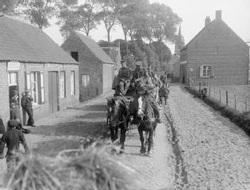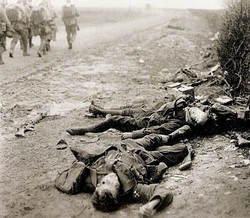The Scots Guards

Stephen Graham joined the Scots Guards in September 1917 as a guardsman (he was determined to experience life in the ranks). His basic training took place at the Guards Camp at Caterham,long referred to as Little Sparta for its harshness. Stephen later wrote a book about his experiences - A Private in the Guards - which caused considerable controversy for its description of the harsh life at Caterham. Stephen himself accepted the experience as being necessary to mould soldiers (he had been honest enough,though, to admit before joining up that he dreaded losing his individuality).
'The defects in the Little Sparta system are the humiliation of recruits by words or blows, the use of glaringly indecent language, the possibility of squaring punishments, the use by N.C.O.’s, even by lance-corporals, of recruits as batmen. I believe these were recognised as defects in peace-time, and some of them had been eradicated, others endured in secret. But in war-time the problem of breaking in those who were never intended by Nature to be soldiers was so difficult that some of these ugly things became useful. Constant humiliation and the use of indecent phrases took down the recruit's pride, and reduced him to a condition when he was amenable to any command.' (A Private in the Guards).
'The defects in the Little Sparta system are the humiliation of recruits by words or blows, the use of glaringly indecent language, the possibility of squaring punishments, the use by N.C.O.’s, even by lance-corporals, of recruits as batmen. I believe these were recognised as defects in peace-time, and some of them had been eradicated, others endured in secret. But in war-time the problem of breaking in those who were never intended by Nature to be soldiers was so difficult that some of these ugly things became useful. Constant humiliation and the use of indecent phrases took down the recruit's pride, and reduced him to a condition when he was amenable to any command.' (A Private in the Guards).
Serving in the Trenches

After leaving Little Sparta, Stephen was posted to Wellington Barracks in London, carrying out guard duty at Buckingham Palace on a number of occasions. His unit was posted to France in March 1918, arriving south at Arras just after some fierce fighting. Over the next few months Graham periodically saw action, as the great German 'push' gradually began to collapse, and the Scots Guards advanced. In A Private in the Guards Graham spoke openly about the casual brutality of war and the harsh treatment of German prisoners. When the Scots Guards moved into Germany following the Armistice, in order to occupy Cologne, he was however struck by the lack of bad feeling between his fellow soldiers and the local population. He instead reserved his scorn for the 'jingo' press back in Britain. He nevertheless made no effort to conceal how the war had brutalised all those caught up in it:
'The regimental tone absolutely forbade admiration of anything in connection with Germans. “Killing Huns” was our cheerful task as one of our leaders once told us. The idea of taking prisoners had become very unpopular among the men. A good soldier was one who would not take a prisoner. If called on to escort prisoners to the cage, it could always be justifiable to kill them on the way and say they tried to escape. Did not so-and-so get a D.C.M. for shooting prisoners? “Thank God, this battalion’s always been blessed with a CO. who didn’t believe in taking prisoners,” says a sergeant. Captain C , who at Festubert shot two German officer-prisoners with whom he had an altercation, was always a hero, and when one man told the story, “That’s the stuff to gi’ ‘em,” said the delighted listeners' (A Private in the Guards).
'The regimental tone absolutely forbade admiration of anything in connection with Germans. “Killing Huns” was our cheerful task as one of our leaders once told us. The idea of taking prisoners had become very unpopular among the men. A good soldier was one who would not take a prisoner. If called on to escort prisoners to the cage, it could always be justifiable to kill them on the way and say they tried to escape. Did not so-and-so get a D.C.M. for shooting prisoners? “Thank God, this battalion’s always been blessed with a CO. who didn’t believe in taking prisoners,” says a sergeant. Captain C , who at Festubert shot two German officer-prisoners with whom he had an altercation, was always a hero, and when one man told the story, “That’s the stuff to gi’ ‘em,” said the delighted listeners' (A Private in the Guards).